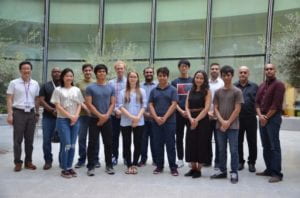
Team iGem from NYU Abu Dhabi who won a gold medal at a competition in Boston for their cost-effective solution to detect E. coli.
By Ibrahim Chehade, NYU Abu Dhabi Biology Instructor
NYU Abu Dhabi’s International Genetically Engineered Machine (iGEM) team has received the university’s first gold medal at the Giant Jamboree held in Boston, US. The Giant Jamboree is a synthetic biology competition that hosts student academic scholars from 310 international teams.
The NYUAD team of 12 biology and engineering students were led by seniors Adrienne Chang and Khairunnisa Semesta, supervised by faculty members and instructors, Dr. Kourosh Salehi-Ashtiani, Dr. Yong-Ak Song, Dr. Mazin Magzoub, Ibrahim Chehade, Ashley Isaac, and Mona Kalmouni.
The project, E. coLAMP, was concerned with the development of a portable and affordable device that is capable of amplifying a genetic marker of the Shiga-toxin-producing E. coli in just 20 minutes using a technique called loop-mediated isothermal amplification (LAMP). The engineering team designed and printed a robust, 3D-printed case, which houses the electrical components and the silicone chip for the biological reactions.
The intended usage of the device provides a simple procedure for the end user. A food sample is swabbed and added to a solution, and the solution is transferred into the silicone chip. The chip can then be placed on the heating base of the device, and the reaction can be easily visualized after 20 minutes. The team was successful in developing a proof-of-concept, which cut down the cost of each reaction to only $4 USD. The result: a cost-effective solution to rampant food contamination in various parts of the world.

3D rendering of a portable device that can detect E. coli in 20 minutes, developed by a team of students at NYU Abu Dhabi.
In the development of E.coLAMP, the team employed a comprehensive design-build-test cycle, integrating feedback from potential users into the design of the device to better meet users’ needs. In the spirit of community service, the NYUAD team also conducted extensive education and engagement programs by inviting 20 Brighton College high school students to NYUAD’s first annual synthetic biology workshop. An outreach program was also conducted in Indonesia to primary school students on food safety and hygienic practices.
Being the only team from the United Arab Emirates, the team hopes to encourage and share their experience with other GCC institutions to help them launch their own iGEM teams in the future. By doing so, they aim to promote the value and importance of interdisciplinary studies in the development of a successful project.
The team offers their gratitude to the Division of Science and the Division of Engineering, as well as the Center for Genomics and Systems Biology for their generous support that helped this program to become a success.
This post comes to us from NYU Abu Dhabi and you can find the original here.